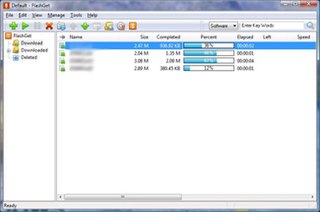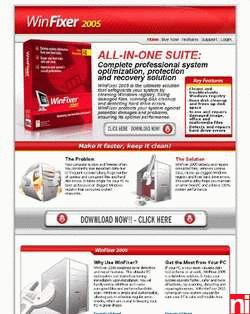Related Research Articles
Konqueror is a free and open-source web browser and file manager that provides web access and file-viewer functionality for file systems. It forms a core part of the KDE Software Compilation. Developed by volunteers, Konqueror can run on most Unix-like operating systems. The KDE community licenses and distributes Konqueror under GNU GPL-2.0-or-later.

ClamAV (antivirus) is a free software, cross-platform antimalware toolkit able to detect many types of malware, including viruses. It was developed for Unix and has third party versions available for AIX, BSD, HP-UX, Linux, macOS, OpenVMS, OSF (Tru64), Solaris and Haiku. As of version 0.97.5, ClamAV builds and runs on Microsoft Windows. Both ClamAV and its updates are made available free of charge. One of its main uses is on mail servers as a server-side email virus scanner.

FlashGet was a freeware download manager for Microsoft Windows. It was originally available in either paid or ad-supported versions, the latter of which included an Internet Explorer Browser Helper Object (BHO).
In computer security, a sandbox is a security mechanism for separating running programs, usually in an effort to mitigate system failures and/or software vulnerabilities from spreading. The isolation metaphor is taken from the idea of children who do not play well together, so each is given their own sandbox to play in alone. It is often used to execute untested or untrusted programs or code, possibly from unverified or untrusted third parties, suppliers, users or websites, without risking harm to the host machine or operating system. A sandbox typically provides a tightly controlled set of resources for guest programs to run in, such as storage and memory scratch space. Network access, the ability to inspect the host system, or read from input devices are usually disallowed or heavily restricted.
Mozilla Firefox has features which distinguish it from other web browsers, such as Google Chrome, Safari, and Microsoft Edge.
Browser hijacking is a form of unwanted software that modifies a web browser's settings without a user's permission, to inject unwanted advertising into the user's browser. A browser hijacker may replace the existing home page, error page, or search engine with its own. These are generally used to force hits to a particular website, increasing its advertising revenue.

WinFixer was a family of scareware rogue security programs developed by Winsoftware which claimed to repair computer system problems on Microsoft Windows computers if a user purchased the full version of the software. The software was mainly installed without the user's consent. McAfee claimed that "the primary function of the free version appears to be to alarm the user into paying for registration, at least partially based on false or erroneous detections." The program prompted the user to purchase a paid copy of the program.
Free Download Manager is a download manager for Windows, macOS, Linux and Android.

Orbit Downloader is a discontinued download manager for Microsoft Windows. Launched in 2006, its developers abandoned it in 2009. In 2013, Orbit Downloader was classified as malware by antivirus software after ESET discovered a botnet in the application.

CCleaner, developed by Piriform Software, is a utility used to clean potentially unwanted files and invalid Windows Registry entries from a computer. It is one of the longest-established system cleaners, first launched in 2004. It was originally developed for Microsoft Windows only, but in 2012, a macOS version was released. An Android version was released in 2014.
Piriform Software Ltd is a British software company based in London, owned since 2017 by Avast which itself became part of NortonLifeLock in 2022. The company develops cleaning and optimisation tools for Microsoft Windows, macOS and Android operating systems, including CCleaner, CCleaner Browser, Defraggler, Recuva and Speccy. On 22 September 2015, Piriform launched CCleaner Cloud, a tool to maintain computers remotely.

VirusTotal is a website created by the Spanish security company Hispasec Sistemas. Launched in June 2004, it was acquired by Google in September 2012. The company's ownership switched in January 2018 to Chronicle, a subsidiary of Google.
Opera is a multi-platform web browser developed by its namesake company Opera. The current edition of the browser is based on Chromium. Opera is available on Windows, macOS, Linux, Android, and iOS. There are also mobile versions called Opera Mobile and Opera Mini. Opera users also have access to Opera News, a news app based on an AI platform.
Google Chrome is a web browser developed by Google. It was first released in 2008 for Microsoft Windows, built with free software components from Apple WebKit and Mozilla Firefox. Versions were later released for Linux, macOS, iOS, and also for Android, where it is the default browser. The browser is also the main component of ChromeOS, where it serves as the platform for web applications.
Pale Moon is a free and open-source web browser licensed under the MPL-2.0 with an emphasis on customization. Its motto is "Your browser, Your way." There are official releases for Microsoft Windows, FreeBSD, macOS, and Linux.
SmartScreen is a cloud-based anti-phishing and anti-malware component included in several Microsoft products:
Mozilla is a free software community founded in 1998 by members of Netscape. The Mozilla community uses, develops, publishes and supports Mozilla products, thereby promoting exclusively free software and open standards, with only minor exceptions. The community is supported institutionally by the non-profit Mozilla Foundation and its tax-paying subsidiary, the Mozilla Corporation.

Torch was a Chromium-based web browser and Internet suite developed by the North Carolina–based Torch Media. As of November 2022, downloads for Torch are no longer available, and upon clicking the download button, users are redirected to the Torch Search extension on the Chrome Web Store.
Download Valley is a cluster of software companies in Israel, producing and delivering adware to be installed alongside downloads of other software. The primary purpose is to monetize shareware and downloads. These software items are commonly browser toolbars, adware, browser hijackers, spyware, and malware. Another group of products are download managers, possibly designed to induce or trick the user to install adware, when downloading a piece of desired software or mobile app from a certain source.
A potentially unwanted program (PUP) or potentially unwanted application (PUA) is software that a user may perceive as unwanted or unnecessary. It is used as a subjective tagging criterion by security and parental control products. Such software may use an implementation that can compromise privacy or weaken the computer's security. Companies often bundle a wanted program download with a wrapper application and may offer to install an unwanted application, and in some cases without providing a clear opt-out method. Antivirus companies define the software bundled as potentially unwanted programs which can include software that displays intrusive advertising (adware), or tracks the user's Internet usage to sell information to advertisers (spyware), injects its own advertising into web pages that a user looks at, or uses premium SMS services to rack up charges for the user. A growing number of open-source software projects have expressed dismay at third-party websites wrapping their downloads with unwanted bundles, without the project's knowledge or consent. Nearly every third-party free download site bundles their downloads with potentially unwanted software. The practice is widely considered unethical because it violates the security interests of users without their informed consent. Some unwanted software bundles install a root certificate on a user's device, which allows hackers to intercept private data such as banking details, without a browser giving security warnings. The United States Department of Homeland Security has advised removing an insecure root certificate, because they make computers vulnerable to serious cyberattacks. Software developers and security experts recommend that people always download the latest version from the official project website, or a trusted package manager or app store.
References
- ↑ Meier, Reto; Lake, Ian (2018-08-23). Professional Android. John Wiley & Sons. ISBN 978-1-118-94954-2.
- ↑ "Definition of download manager". PCMAG. Retrieved 2024-04-14.
- ↑ Agarwal, Shubham (2019-06-13). "Do You Need a Download Manager on Android? The 3 Best Apps Worth Trying". MUO. Retrieved 2024-04-14.
- ↑ Yeow, Cheah Chu (2005). Firefox Secrets. SitePoint Pty Ltd. ISBN 978-0-9752402-4-3.
- ↑ Neowin ·, Paul Hill (2024-04-14). "How to use Telegram's well-hidden download manager". Neowin. Retrieved 2024-04-14.
- ↑ Das, Ankush (2023-09-13). "Linux Malware! Read This If You Use Free Download Manager". It's FOSS News. Retrieved 2024-04-14.
- ↑ published, Craig Hale (2023-09-13). "This free download manager site actually just redirected Linux users to malware for years". TechRadar. Retrieved 2024-04-14.
- ↑ Fisher, Tim (2023-11-09). "8 Best Free Download Managers". Lifewire. Retrieved 2024-04-14.
- ↑ Sharma, Ax (2022-09-24). "Fake Chrome extension 'Internet Download Manager' has 200,000 installs". BleepingComputer. Retrieved 2024-04-14.